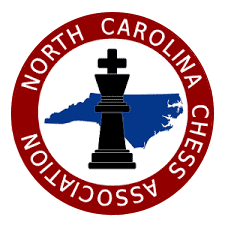
North Carolina Chess Association
NCCA officers
Charles Roberson – President
John Timmel – First Vice President
Grant Oen – Scholastic Vice President
Wayne H. Spon – Secretary/Treasurer
North Carolina Gambit – October 2022
This month’s Contributors
Charles Roberson
Gordan Ray
John Timmel
In this issue, you will find:
Gordan Ray – Tribute to “Big Jim” Watson
Charles Roberson – Gambit Interviews: Vishnu Vanapalli and Dean Ippolito
article on Chess Ratings Online to USCF Rating System Conversion
John Timmel – To Move and Win! featuring Dean Ippolito
We’re looking for contributors to the Gambit!
Submit your games, articles, etc. to the editor Charles Roberson at croberson2@triad.rr.com
Tribute to “Big Jim” Watson
by Gordan Ray
On September 29, 2022, our Chess Community lost a very charismatic member. “Big Jim” Watson was not only a mentor to me but a very dear friend. Just a couple of months before he passed I was able to share with Jim a poem that I had written. With that in mind, I wish to recognize him by posting it in his memory. Rest in Peace, my friend.
WHICHEVER MAY BE THE FATE
As Well-Seasoned Troops Arrive
They Face the Plain They Must Cover
And Over the Checkered Battleground
An Eerie Haunting Still Silence Doth Hover.
Now in a World of Light and Dark
The Invisible is Most Real.
For in the Mind, The Game is Played
Where the Monarch is Trapped, and yet Never Slayed.
And as the Game Slowly Unfolds
The Files are Opened and Controlled.
The Diagonals are Strategically Crossed
And the Lowly Pawns are Promoted or Lost.
The Knight, He’s the Silent Killer
Who Lurks About Where’er He May
Always Changing Colors to Steal
Another More Powerful Soldier Away.
Alas if the Fortress has Crumbled,
The King Must Flee or be Humbled.
Boldly Fighters Win or They Die
But Sometimes There is a Truce, They will Call a Tie.
Then Whichever May be the Fate
All of the Chaos Must be Cleared.
Warriors are Buried in a Box
To Proudly Come Alive Again, Without Fear.
Submitted by Gordan Ray
NC Chess Interviews – Vishnu Vanapalli
Vishnu has a USCF NM title, a FIDE FM title and he is 15 years of age.
Do you have a favorite tournament?
A definite turning point in my chess was the 2021 US Masters. I had prepared a lot for this tournament and was hoping it would go well. But I had to grapple with the fact that no matter how much I worked, the outcome wasn’t entirely in my hands; it was almost like rolling dice. Preparing for a tournament isn’t a guarantee you’ll win the tournament or even that you’ll do well; rather, it’s just making the dice a little more weighted.
At the start of the tournament, I had some shaky games, but I’ve learned to never consult the engine about the quality of play during the tournament. Even if you think you played one of the most brilliant games of your life, chances are the engine will say you missed something, which can be a real hit to your confidence. Oftentimes, (a bit worryingly) it’s enough to think you are a genius rather than genuinely be a genius.
Eventually, I was able to hit a stride after winning a game and was able to use my defensive skills to escape poor positions. Not only did I earn an IM norm from this event, but I also learned I could compete against IMs and GMs consistently; something I hadn’t really felt before. Ive always kept this tournament close to heart, reminding me I have what it takes even if the dice think otherwise.
How long have you been striving for the FM title? What do you like about chess in general?
I haven’t been directly striving for FM, but it’s the culmination of years of work — a stepping stone on the path. Before the summer of 2020, I wouldn’t say I fell in love with the game: I liked it, but it wasn’t the engrossing passion it is now. Around that summer, I started being more disciplined about my chess training, and since then I haven’t looked back. The title was a culmination of my work— and it’s always so much more meaningful when the time you pour into this game is for yourself rather than for anyone else.
I’ve committed myself to this game (as cliche as it is) because I’ve truly loved it. Chess has served as a never-ending pursuit of knowledge, a never-ending obsession with asking questions, and a never-ending pursuit to be whole. It makes me feel that every day I can achieve something whether to dive deeper into an opening or study a complex ending. I have given so much to chess and it has given me so much in return, and for that, I will forever be grateful. No matter where the path leads, these stepping stones will always prove pivotal, acting as pillars supporting an unbounded future.
How do you deal with a loss?
I come to terms with losses by thinking about the tournaments ahead and the opportunities that may present themselves there. There is really no end to this journey. One must just keep riding with the punches and hope that when they strike back, it’s golden.
Do you have advice for others?
To those trying out chess for the first time, try to give it a fair shot. I know it can seem like a mundane game at first, but it can really be magical. If you go into it with an open mind, you may be surprised. If you find yourself playing because you, yourself, want to, then you have found a true gem. When the motivation to learn, play, and improve comes from within, seeing results is so much more meaningful. If not, then there are plenty of other activities you can find joy in.
Where would you like to go with chess from here?
Chess has done wonders for me and I could not imagine my life without it. As I continue to strive to improve, I also would like to spread chess to more players, so they too can experience the benefits chess has to offer. I’ve founded a non-profit called Fighting Knights Chess Academy
(https://www.fightingknightschessacademy.org/)
to increase the accessibility of this great game for youth. I plan to conduct lessons for interested students with a focus on personal development through chess.
NC Chess Interviews – Dean Ippolito
We have an interview with Dean Ippolito. Dean is an IM that has moved to NC this year and he teaches chess. As you would expect, he tells us he’d like to make it to GM and he is working on it.
What brought you to NC?
I love the people and the area and the quality of life that NC provides and want to help grow the chess community here. I’m excited to be able to work with the students in the schools in the Carolinas.
Do you teach? and who (age groups…), how (online…)?
I teach mainly elementary age students online, privately, and in schools. I’ve worked with over 30,000 students over the past two and a half decades.
Could you tell us a bit about your teaching, teaching philosophy, and how potential students should contact you?
Both of my parents were school teachers. My father taught chess in addition to many other subjects. I began teaching private lessons and in camps when I was 10 and after-school programs when I was 12. I started my teaching business 21 years ago after playing professionally for several years. Since then, my organization has taught over 50,000 students and I have personally taught over 30,000.
My teaching is always geared toward making things fun and memorable for the students. I normally incorporate stories into every lesson as entertaining memory markers for the students. I especially enjoy working with younger students since it gives me the best chance at helping gear them toward reaching their potential. I taught my three oldest children how to play chess before they were three and am currently teaching my 2-year-old.
If anyone is interested in classes, they can email me at dean@deanofchess.com
What is your background outside of chess?
I’ve always played chess and almost every job that I’ve had since age 10 has involved teaching chess.
What is your favorite life lesson from chess or vice versa?
Never quit.
Do you have a favorite tournament?
Currently, the Rilton Cup in Sweden.
How does it feel to have made that accomplishment?
I will let you know when I finally make grandmaster 🙂
How long have you been striving for it?
For almost 40 years.
How long has it felt realistic?
The past 15+ years.
Were you really sure you were going to achieve it this time?
Yes.
How do you celebrate a victory?
By analyzing the game.
How do you deal with a loss?
Immediately working on the flaws that lead to it.
What other titles have you won?
The biggest titles were the National High School Championship, US Cadet, and Denker tournament.
How/who did you get into chess?
My father taught me.
How long have you been playing chess?
Over 40 years.
How old were you when you started playing chess?
2 and a half.
Were there breaks and when did you get serious?
The only break that I had was between 6 and 7 after a bad car accident. After that year long hiatus, I never stopped playing.
What was your first chess rating?
927
What was your peak chess rating?
Almost 2600
What is your favorite thing about chess?
Not relying on or blaming anyone for the outcome since it’s an individual competition.
When did you break each of the class levels… Was there one that took longer than you’d have liked?
I went from around 1000 to 1800 in under 2 years. There were certain plateaus after that which lasted as long as 2 years.
What do you like about chess in general?
The competition.
What do you like about chess tournaments?
The competitive atmosphere.
Where would you like to go with chess from here?
Continue to help as many students as possible reach their potential and make grandmaster myself.
Do you have advice for others?
The most important thing is to never quit.
Who is your favorite player?
Carlsen ever since he turned down a draw against Anand in 2013 to clinch the World Championship.
Which players would you like to meet?
I’ve met many of the top players at some point, some over the board.
What tournaments would you like to spectate?
The World Championship.
What tournaments would you like to participate in?
The World Senior.
Do you have a favorite historical chess game?
Capablanca-Marshall
Do you have a favorite game of your own?
A few but recently Sasikiran 2017.
Have you moved around (States, Cities…)?
I’ve always lived in NJ until this year.
What are your favorite online chess sites (playing and training)?
Lichess for playing and chess.com for puzzles.
What is/are your favorite chess book?
Kasparov’s “My Great Predecessors” series.
Who is/are your favorite chess book author?
Dvorestsky
Who is/are your favorite chess streamer?
I haven’t watched a lot of it.
What other sports do you enjoy or compete in?
Soccer, basketball, track.
Is/Are there chess club(s) that you’d like to visit?
I’d like to visit the St Louis club.
Chess Ratings Online to USCF Rating System Conversion
by Charles Roberson
I’ll point out 3 myths and disprove them.
- Some people say that you can’t compare the different rating systems because they are different systems: that is wrong.
- Some say that you can’t compare the different systems because they are different and they have different starting points: that is wrong.
- Some say you convert any online rating to USCF just subtract 300 points: that is wrong.
Conceptual Proof:
Let’s assume that all the rating systems are good ones. If they are then they share at least 3 fundamental properties:
- When a person’s skill level improves, their rating goes up.
- When a person’s skill level stays the same, their rating stays roughly the same.
- When a person’s skill level decreases, their rating decreases.
As your skill level changes, both systems should go up or down roughly together but not necessarily by the same amount. If two rating systems share the above properties then they are likely correlated which means they can be compared! The process for comparing them is correlation analysis. This disproves myths 1 and 2.
Some of the online rating systems use an old variant of the USCF system, some use Glicko #1 and others use Glicko #2. Also, some assume that the average rating should be 1200 and others use as much as 1500. So, there is not a simple single number to add or subtract to/from online ratings to get USCF or FIDE ratings, because your rating from one server to another is not likely to be the same. This argument disproves myth #3.
The people at chessgoals.com have studied the various correlations between Chess.com, LiChess, USCF and FIDE ratings. Their published work is fairly normal. They use linear regression to find the best-fit straight line in comparing and converting Chess.com bullet, blitz and rapid ratings to USCF and FIDE classical ratings. Also, they compare and convert LiChess bullet, blitz, rapid and classical ratings to USCF Regular and FIDE classical ratings using linear regression. While linear regression is obvious to try, I believe there is a better way.
I don’t think it is the best way because I don’t believe converting a range of Chess.com or LiChess bullet/blitz ratings to USCF or FIDE classical ratings is likely to be linear (a straight line). If it were then there would be a constant number that you add/subtract to/from one TC rating to get USCF a rating for all people up and down the scale. Given my chess tournament experiences, that doesn’t make sense.
Everybody that has run a long TC tournament has noticed a certain issue: the competitors in the upper rated sections take their time and the competitors in the lowest rated section finish much quicker. When I ran the 2022 NC Girls Chess Championships, the TC was G/45 d5 and the girls in the upper section used most of their time each round while the girls rated below 700 barely consumed 10 minutes total for both sides. Given that the lower rated sections play at blitz speeds no matter how much time you give them, I expect their blitz ratings to be closer to their regular ratings than the ratings of higher rated opponents. This concept suggests that the mapping function is not a straight line; it should a convex curve.
To test this, I obtained the data that chessgoals.com used to calculate the conversion of Chess.com ratings to USCF. I ran linear regression analysis and obtained a simple straight line correlation. I then ran curve fitting experiments with various polynomials. The one that fit the data the best produced a convex curve instead of a straight line. More on this next month.
To Move and Win! presented by John Timmel
This month we feature moves sent to us by North Carolina Champion Dean Ippolito.
Notes by Dean
Ippolito,D 2337
Sasikiran,K 2680
47th Rilton Cup 2017-18 (1.1) 27.12.2017
1.d4 d5 2.c4 c6 3.Nf3 Nf6 4.Qb3 dxc4 5.Qxc4 Bf5 6.g3 Nbd7 7.Nc3 e6
8.Bg2 Be7 9.0-0 Rc8 10.a4 a5 11.Nh4 Bc2 12.e4!
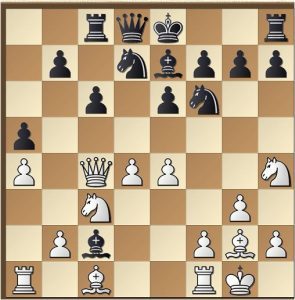
0-0 13.Qe2 Bb3 14.Nf3 c5 15.d5 e5 16.Nb5 Re8 17.Nd2 c4 18.d6 Bf8 19.Nxb3 cxb3
20.Nc7 Rxc7 21.dxc7 Qxc7 22.Be3 Nc5 23.Qb5 Re6 24.Rac1 Rc6 25.f3 Ne8
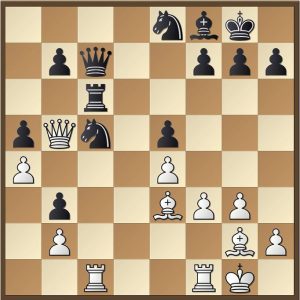
26.Rxc5!
[ 26.Bxc5 doesn’t work due to Rxc5 27.Rxc5 Bxc5+ ]
27.Qxe8 Rc2 28.Rd1 Qe7 [ 28…Rxb2 29.Rd8 Rb1+ 30.Bf1 h6
31.Qxf8+ Kh7 32.Qh8+ Kg6 33.Rg8 f6 34.Qxh6++- ]
29.Qxe7 [ 29.Rd8 Qxe8 30.Rxe8 is even more accurate according to the engine but
my move seemed more practical ] 29…Bxe7 30.Rd2 Bc5 31.Rd8+ Bf8
32.Bf1 h5 33.Rd2 [ 33.f4 f6 34.Bd3 is even a little
stronger according to the engine ] [ 33.Re8 f6 34.Rb8 b6 35.Bd3 Rxb2
36.Bc4+ Kh7 37.Rxf8 Rb1+ 38.Kg2 b2 39.Bg8+ Kg6 40.f4 exf4 41.gxf4
Rg1+ 42.Kh3+- asmF ] 33…Bc5 34.Rd8+ Bf8 35.Bd3
[ 35.f4!? Rxb2 36.Bc5 was +7 ]
35…Rxb2 36.Bc5 Rd2 37.Bxf8 Kh7 38.Rd6
[ 38.Be7 Rd1+ 39.Bf1+- ]
[ 38.Rd5!? ]
38…b5 39.axb5 Rd1+
[ 39…b2 40.Bb1+- ]
40.Bf1 Rb1 41.Rd2! b2 42.Rf2 1-0
Ippolito,D – Shabalov,A
Peabody, 2007
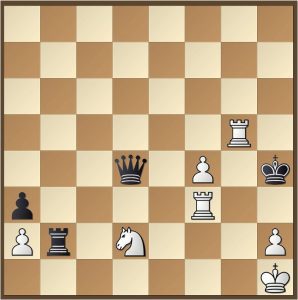
64.Rh3+! Kxh3 65.Rg3+ Kh4 66.Nf3+ Kh5 67.Nxd4 Rxa2
[67…Rd2 ‘is the last trick” 68.Nb5+- (68.Nf5?? Rxh2+ 69.Kg1 Rg2+ 70.Kxg2) ]
68.Nf5 after 11 consecutive losses to GM Shabalov, this was the first time I won.
Ippolito,D – Nakamura,H
NY Masters, 2003
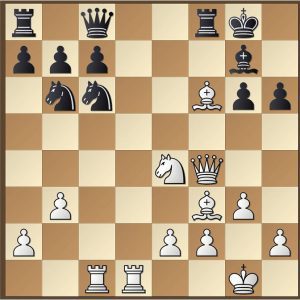
21.Rxc6! bxc6 22.Qe5 White is winning after this exchange sacrifice 22…Rxf6! 23.Nxf6+ Kf7 24.Bxc6 Bxf6 25.Qf4 g5 26.Qe4 Rb8 27.a4! Qe6 [27…a5 28.b4!]
28.Rd7+! Another small tactic 28…Nxd7 29.Bd5 Qxd5 30.Qxd5+± Ke7 31.Qe4+ Kd8 32.b4 Be7 33.b5 Bc5 34.h4 Rb6 35.hxg5 hxg5 36.Qa8+ Ke7 37.Qg8 Rf6 38.e3 Ne5 39.Qd5 Nf3+ 40.Kg2 Bd6 41.a5 g4 42.Qb7 Rh6 43.b6 axb6 44.axb6 Rh2+ 45.Kf1 Rh1+ 46.Ke2 Re1+ 47.Kd3 Rd1+ 48.Ke4?? [48.Kc2 Rd2+ 49.Kc1 Ba3+ 50.Kb1 Rb2+ 51.Ka1 Nd2 52.Qxc7+=] 48…Kf6 49.Qd5 Ng5+ 0-1
Ippolito,D (2373)- Portisch (2564)
Linares Anibal op 7th 2000
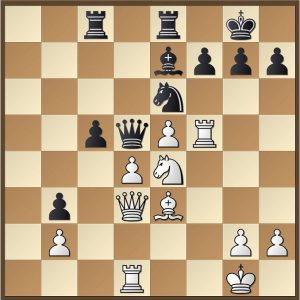
30.Nf6+! gxf6 [30…Bxf6 31.exf6±] 31.exf6 Qd7 [31…c4±]
32.fxe7 c4! 33.Qe4? [33.Qd2 was easily winning]
33…Ng7 and this resource let the famous GM save the position,
and even getting a winning position in time pressure.
Then something amazing happened- he overstepped on the last move of time control and lost,
but came back to win the tournament anyway!: 1-0
Becerra,J – Ippolito,D
HB Global, 2005
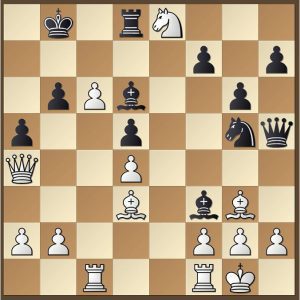
21…Qh3!-+
This was the luckiest tactic I’ve had against a GM.
22.c7+ Ka7 23.c8N+ Kb8! 0-1
[23…Rxc8?? 24.Qd7+! and white is still better]